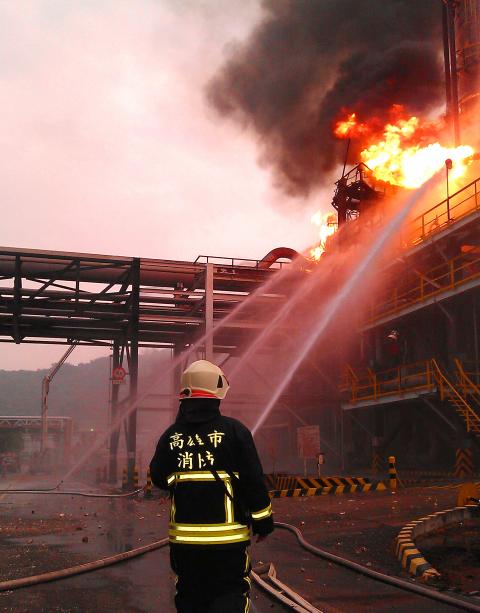A fire broke out yesterday at a petrochemical factory operated by state-run oil refiner CPC Corp, Taiwan (CPC, 台灣中油) in Greater Kaohsiung, with a preliminary report indicating there were no casualties, toxic gas emissions and water leaks.
The fire started in a butadiene storage facility at the CPC Kaohsiung Refinery in the early hours of the morning, Lee Shun-chin (李順欽), head of the refinery, said at a press conference.
Firefighters extinguished the blaze after battling it for more than five hours, Lee said, adding that there were no reports of injury or anyone missing, and that there were “no leaks of toxic gas or wastewater” from the petrochemical complex.

Photo: CNA
The fire, which resulted from a fractured pipe in the factory’s distillation tower, will cause estimated losses of about NT$50 million (US$1.69 million) because the plant has been ordered to shut down for repairs and safety checks, which will take at least one month to complete, Lee said.
Prior to the fire, the factory produced 40 percent of CPC’s total butadiene, an important industrial chemical used as a monomer in the production of synthetic rubber, Lee said.
Earlier in the day, the Greater Kaohsiung Bureau of Environmental Protection slapped the refinery with a fine of NT$1 million for air pollution, the heaviest possible punishment for a violation of the Air Pollution Control Act (空氣污染防制法).
In addition to the fine, CPC is facing outrage from local residents, who have for many years said the refineries’ waste products have been polluting the environment.
Outside the refinery, Greater Kaohsiung Mayor Chen Chu (陳菊), who was joined by angry protesters, told CPC to stick to its promise to relocate the aging refinery by 2015.
She also told CPC not to ignore safety at its plants simply because they might be moved soon.
Meanwhile, Chinese Nationalist Party (KMT) Legislator Huang Chao-shun (黃昭順) demanded that CPC begin an overall safety check of its Greater Kaohsiung oil refinery.
The refinery “must stop all its operations” before the checks prove that it is safe to operate, Huang said.
“We cannot let people live alongside a ticking time bomb,” she said.
Huang’s call was echoed by Democratic Progressive Party Legislator Lin Tai-hua (林岱樺).
Earlier, CPC chairman Chu Shao-hua (朱少華) issued a public apology for the fire. Pledging to reinforce its efforts to improve safety, Chu added that the accident would not affect the company’s oil prices.

CAUTIOUS RECOVERY: While the manufacturing sector returned to growth amid the US-China trade truce, firms remain wary as uncertainty clouds the outlook, the CIER said The local manufacturing sector returned to expansion last month, as the official purchasing managers’ index (PMI) rose 2.1 points to 51.0, driven by a temporary easing in US-China trade tensions, the Chung-Hua Institution for Economic Research (CIER, 中華經濟研究院) said yesterday. The PMI gauges the health of the manufacturing industry, with readings above 50 indicating expansion and those below 50 signaling contraction. “Firms are not as pessimistic as they were in April, but they remain far from optimistic,” CIER president Lien Hsien-ming (連賢明) said at a news conference. The full impact of US tariff decisions is unlikely to become clear until later this month

With an approval rating of just two percent, Peruvian President Dina Boluarte might be the world’s most unpopular leader, according to pollsters. Protests greeted her rise to power 29 months ago, and have marked her entire term — joined by assorted scandals, investigations, controversies and a surge in gang violence. The 63-year-old is the target of a dozen probes, including for her alleged failure to declare gifts of luxury jewels and watches, a scandal inevitably dubbed “Rolexgate.” She is also under the microscope for a two-week undeclared absence for nose surgery — which she insists was medical, not cosmetic — and is

GROWING CONCERN: Some senior Trump administration officials opposed the UAE expansion over fears that another TSMC project could jeopardize its US investment Taiwan Semiconductor Manufacturing Co (TSMC, 台積電) is evaluating building an advanced production facility in the United Arab Emirates (UAE) and has discussed the possibility with officials in US President Donald Trump’s administration, people familiar with the matter said, in a potentially major bet on the Middle East that would only come to fruition with Washington’s approval. The company has had multiple meetings in the past few months with US Special Envoy to the Middle East Steve Witkoff and officials from MGX, an influential investment vehicle overseen by the UAE president’s brother, the people said. The conversations are a continuation of talks that

CHIP DUTIES: TSMC said it voiced its concerns to Washington about tariffs, telling the US commerce department that it wants ‘fair treatment’ to protect its competitiveness Taiwan Semiconductor Manufacturing Co (TSMC, 台積電) yesterday reiterated robust business prospects for this year as strong artificial intelligence (AI) chip demand from Nvidia Corp and other customers would absorb the impacts of US tariffs. “The impact of tariffs would be indirect, as the custom tax is the importers’ responsibility, not the exporters,” TSMC chairman and chief executive officer C.C. Wei (魏哲家) said at the chipmaker’s annual shareholders’ meeting in Hsinchu City. TSMC’s business could be affected if people become reluctant to buy electronics due to inflated prices, Wei said. In addition, the chipmaker has voiced its concern to the US Department of Commerce